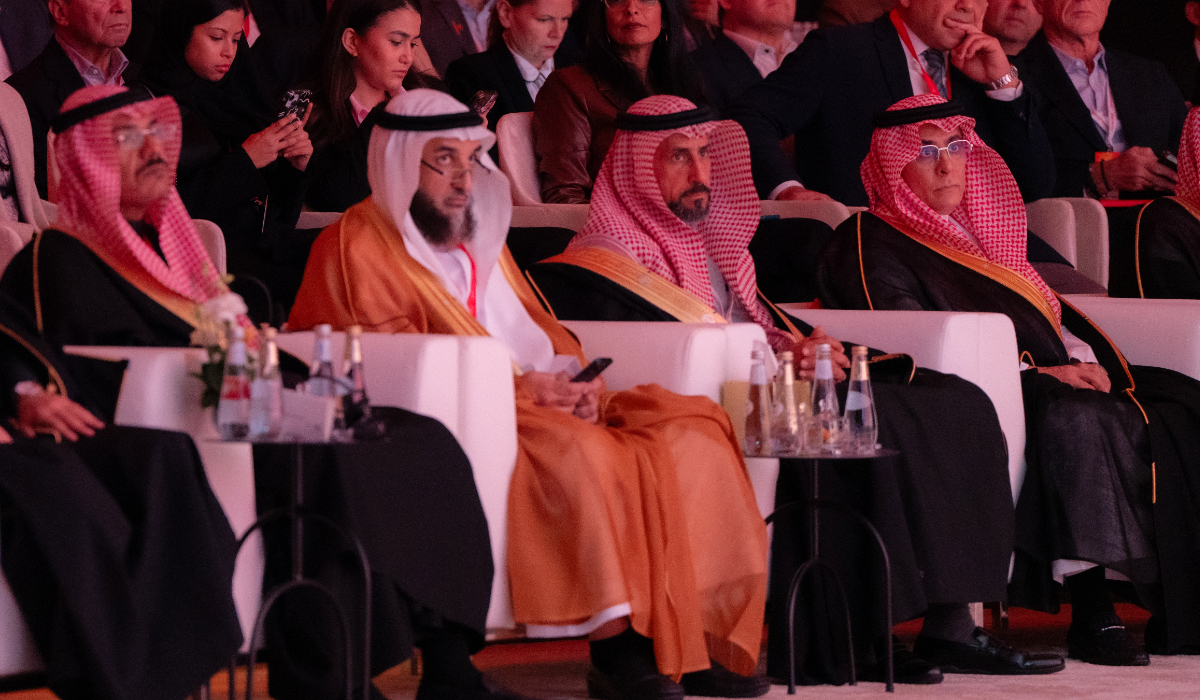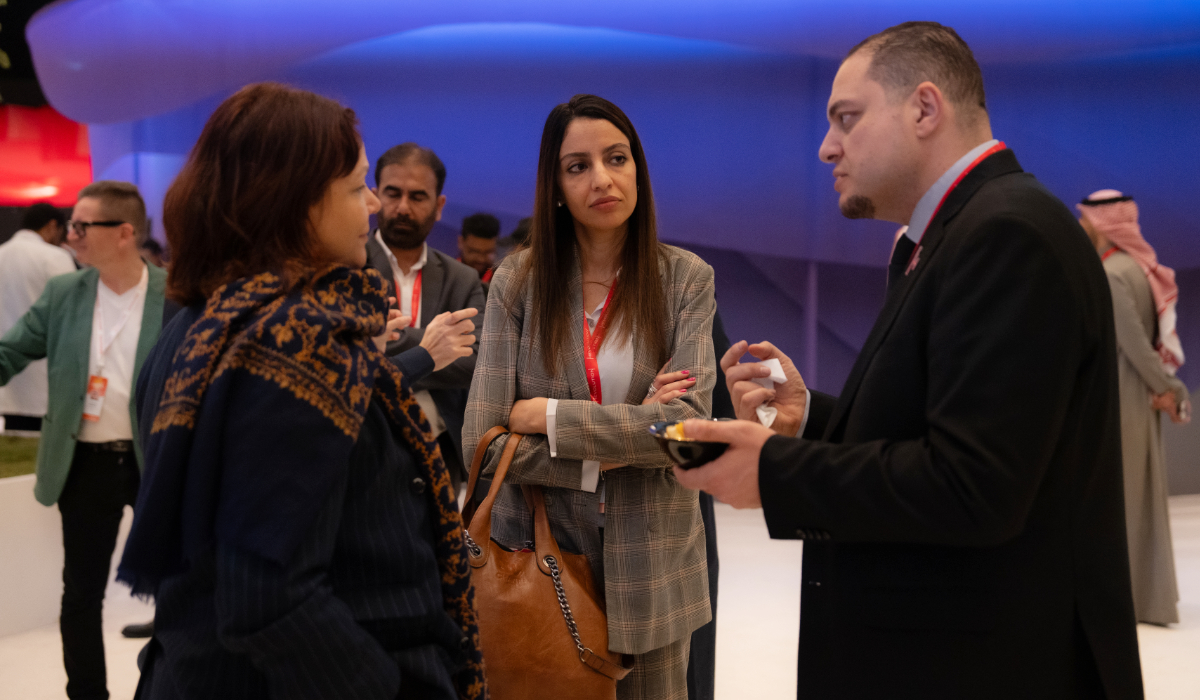RIYADH: “It is a historical relationship,” said British Ambassador to Saudi Arabia Neil Crompton, describing Saudi-UK ties in a new interview with Arab News.
British Prime Minster Keir Starmer made his first visit to Saudi Arabia this week to meet Crown Prince Mohammed bin Salman and discuss areas of cooperation with some of the Kingdom’s industry leaders.
Both the prime minister and the crown prince want to modernize the relationship, Crompton said.
“I have been here nearly five years, and I have just seen the areas of cooperation expand, in part because there is so much happening in the Kingdom … All the different things (Saudi Arabia is) trying to do — tourism, innovation, artificial intelligence, sport — these are all natural areas where the UK can work with you.”
The prime minister’s top priority is encouraging economic growth in the UK, Crompton added, a goal that is reflected in the Saudi government’s own aspirations to grow its economy and improve the quality of life of its citizens.
“Like Saudi Arabia, we are free traders,” he said. “The more UK investment there is in Saudi Arabia, the better it is for Saudi and our investors, and the more Saudi investment there is in the UK, the better is for our economies.”
Crompton said that both leaders are pursuing a UK-Gulf Cooperation Council free trade agreement and hoping to get it finalized as soon as possible.
“The Gulf countries are on the move; they’re all booming,” he added. “Saudi (gross domestic product) has grown 70 percent since Vision 2030 was launched in 2016. That’s impressive.”
Major talking points of discussions with Starmer included partnerships in clean energy and moving his Plan for Change forward.
Green energy projects in both countries have created over 4,000 additional jobs, the UK government reported.
In partnership with NEOM, Graphene Innovation Manchester has announced the launch of the world’s first commercial production of graphene-enriched carbon fiber.
The project strives to generate £250 million ($318 million) in investment in research and innovation in the Greater Manchester region and create more than 1,000 skilled jobs.
Further uplifting the green energy partnerships between the two Kingdoms, Starmer said: “Oxford-based private equity fund HYCAP is supporting Saudi Arabia’s plans to reach net zero emissions by 2060 by investing £785 million to develop hydrogen mobility clusters in Northern Ireland and across the UK, creating more than 1,000 jobs.”
The project will deliver critical elements of hydrogen production and distribution while removing 25 million tonnes of transport-related CO2 over its duration.
The UK and Saudi Arabia are also working to create a new Joint International Institute for Clean Hydrogen, backed by several Saudi and British universities, with Newcastle University playing a leading role.
UK Secretary of State for Energy and Climate Change Edward Miliband said: “This is the government’s Plan for Change in action, to make us a clean energy superpower and deliver a decade of renewal.”
In early December, UK leading carbon capture technology company Carbon Clean signed a collaboration deal with Saudi Aramco for innovation in modular carbon capture technology, hoping to create 2,000 jobs in the UK.
Additionally, UK-based sustainable cement company Next Generation SCM and Saudi Arabia-based company City Cement partnered to produce and supply 2.5 million tonnes of sustainable cement and concrete a year. Over the next five years, this partnership is expected to drive £200 million in investment and create over 200 jobs in both Saudi and the UK.
“Saudis historically like to invest, but a lot of the investment went into London, which is good. But I think, when we invest in different parts of Saudi Arabia, and when Saudi Arabia invests in different parts of the UK, that’s good for both countries and good for both peoples,” Crompton said.
“It shows in the sense that the economic relationship extends beyond the two capitals.”
Another highlight of the British prime minister’s visit was the promotion of cultural heritage for both nations.
The Saudi Heritage Commission is in the middle of finalizing a new deal with Historic England, a public body of the British government, for cooperation and knowledge-sharing between experts from both countries on preserving cultural landmarks.
The Royal Commission for AlUla will also collaborate with UK entities — the Department for Culture, Media, and Sport and the Department for Business and Trade — to increase visitor numbers to 2 million tourists per year by 2035 and upskill the local people through training programs.
Starmer said in a statement: “I’m pleased the UK is forging new partnerships with Saudi Arabia to protect the cultural heritage of AlUla by harnessing British expertise. Through deeper economic ties with key partners such as Saudi Arabia, we can unlock growth and new opportunities both at home and abroad to deliver change that is felt by working people in the UK.”
Cooperation in defense and security was also strongly emphasized by Starmer during his visit to the Kingdom.
“We have a shared history, and part of our shared history is recognition that Saudi Arabia is a key diplomatic partner, not just in the Arab world, but in the Islamic world. I think it has a neutral ability to bridge gaps both between East and West and North and South,” Crompton said.
Crompton explained that Saudi Arabia is an “indispensable partner” for discussing international issues and a “key partner” in de-escalating conflicts in the Middle East and getting to a two-state solution between Palestine and Israel.
Starmer said the UK will play a more active role in the region and work to strengthen defense cooperation across land, sea, space, air, and cyber threats.
He has also announced £11 million in funding for humanitarian aid in Syria, hoping to meet the needs of the 370,000 people estimated to have been recently displaced.
Starmer said: “From cutting the cost of living for hardworking British people to building resilient supply chains or supporting communities in Britain, what happens in the Middle East matters at home.
“That is why we are strengthening our defense partnership with Saudi Arabia, protecting the most vulnerable in Syria, supporting our partners in Lebanon and working with the international community to push for a ceasefire in Israel and Gaza, secure the return of all hostages and accelerate aid into Gaza.”
It was recently revealed by the British Chamber of Commerce that Israel’s war on Gaza has impacted 50 percent of UK businesses.
The UK will also provide the Lebanese Armed Forces with a large assistance package in the form of training and equipment in support of the ceasefire agreement between Lebanon and Israel.
On furthering international cooperation, Crompton said that KSrelief, the Saudi Fund for Development, and the UK pledge to spend $100 million between them each year on joint development projects in Africa.






























